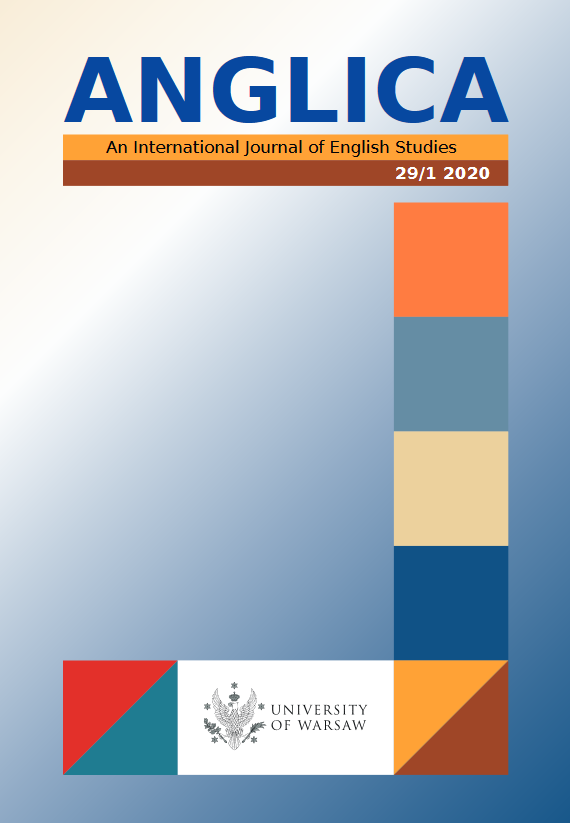Numer 29 (1/2020)
|
Spis treści
Strony
Pobierz
|
|||||
|
Jacek Olesiejko
The Economy of Property and Prosperity in Daniel of the Old English Junius Manuscript: A View on the Poem’s Syncretism
DOI: 10.7311/0860-5734.29.1.01
5 – 27
|
|||||
|
Słowa kluczowe Old English Daniel |Old English biblical verse |Old English poetry |Anglo- Saxon England |BeowulfStreszczenie The heroic economy of treasure subtends both the treasure plundered from the temple in Jerusalem by Nebuchadnezzar and the political structure of Babylon in the Old English Daniel. The golden idol that Nebuchadnezzar erects is a sign of the worldly glory and wealth that generates the flow of goods in the heroic economy of exchange of honour. The aim of the paper is to argue that the Daniel poet makes a contrast between the secular flow of treasure, at the foundation of Nebuchadnezzar’s power, and the divine economy of grace, at the centre of the covenant between the Hebrews and God. INFORMACJE O AUTORZE
Uniwersytet im. Adama Mickiewicza w Poznaniu
|
|||||
|
Tomasz Wiącek
Pilate as the Legal ‘Other’ in the N-Town Cycle Passion Plays
DOI: 10.7311/0860-5734.29.1.02
29 – 40
|
|||||
|
Słowa kluczowe medieval literature |medieval theatre |law |legal procedures |the Other/OthernessStreszczenie In the late medieval N-Town Cycle Passion Plays, the trial of Jesus is presented in the context of a medieval courtroom, where Jesus is brought by Annas and Cayphas to be judged by Pontius Pilate. However, while the priests through abuses of the legal procedures attempt to ensure Jesus’s demise, Pilate opposes their intent by remaining true to his judicial duties, which presents him as a lonely Other in the presented world of legal misconduct. This paper explores the concept of otherness in a legal context of the plays, as well as the legal and social significance of Pilate’s actions. INFORMACJE O AUTORZE
Uniwersytet Warszawski
|
|||||
|
Mónica Fernández Jiménez
The Anti-Essentialist Poetics of Claude McKay’s Banjo
DOI: 10.7311/0860-5734.29.1.03
43 – 56
|
|||||
|
Słowa kluczowe Caribbean |nationalism |colonialism |rhizome |AmericanityStreszczenie This article analyses Claude McKay’s 1929 novel Banjo focusing on its anti-essentialist approach to black identity. Such prevalent anti-essentialism differs from the racial pride politics of the Harlem Renaissance, the literary movement with which McKay is usually associated. The rhizomatic poetics of this work will be explained through the fluid character which Glissant and other later Caribbean regionalist critics ascribe to the Caribbean text. This approach favours a hemispheric perception of the Americas which aligns with McKay’s ideas on black identity. Thus, it will be concluded that the prevalence of the American influence in Banjo despite its European setting reflects Quijano and Wallerstein’s model of Americanity for explaining the modern world order which saw its dawn in the Caribbean with the arrival of the Europeans. INFORMACJE O AUTORZE
Universidad de Valladolid, Hiszpania
|
|||||
|
Julia Siepak
Dimensions of Decolonial Future in Contemporary Indigenous Speculative Fiction: Louise Erdrich’s Future Home of the Living God and Rebecca Roanhorse’s Trail of Lightning
DOI: 10.7311/0860-5734.29.1.04
57 – 74
|
|||||
|
Słowa kluczowe feminism |decolonization |speculative fi ction |Indigenous futurism |Indigenous literature |AnthropoceneStreszczenie Departing from the traditional representations of the colonial past and its aftermath, speculative fiction emerges as a new important trend in the North American Indigenous literary landscape, allowing Native writers to represent decolonial futures. This article focuses on the representations of the future offered by two recent Indigenous speculative novels: Louise Erdrich’s Future Home of the Living God (2017) and Rebecca Roanhorse’s Trail of Lightning (2018), in the context of their decolonial potential. The analysis of the selected literary texts pays special attention to the status of women and its revision, as well as to the re-narrativization of space in the face of the anthropogenic climate change, and their significance to Indigenous decolonial project. In order to facilitate the discussion of the Indigenous speculative novels, the article refers to recent theories in Native American studies concerning Indigenous futurism, Native dystopia, and definitions of decolonization. INFORMACJE O AUTORZE
Uniwersytet Mikołaja Kopernika w Toruniu
|
|||||
|
Barbara Miceli
Infanticide and the Symbolism of Evil in Joyce Carol Oates’s “Dear Husband”
DOI: 10.7311/0860-5734.29.1.05
75 – 85
|
|||||
|
Słowa kluczowe Paul Ricoeur |Joyce Carol Oates |the Yates Case |evil |infanticideStreszczenie In 2001, a Texan housewife, Andrea Yates, drowned her five children in a bathtub, claiming that she had killed them to save them from evil. Her life sentence for murder was later suspended, and Yates was transferred to a psychiatric facility. In 2009, Joyce Carol Oates published the short story “Dear Husband,” inspired by the Yates case. The author structured her story as a letter which Lauri Lynn writes to her husband to confess to the murder of their five children before she takes her life. The aim of this article is to analyze the story using the categories elaborated by Paul Ricoeur to define evil and its symbolism and to try to answer the question: is Andrea Yates/Lauri Lynn a villain or a victim? INFORMACJE O AUTORZE
Uniwersytet Gdański
|
|||||
|
Steffen Wöll
Shuffling Narratives: Apocalypticism, Postmodernism, and Zombies
DOI: 10.7311/0860-5734.29.1.06
87 – 107
|
|||||
|
Słowa kluczowe horror |zombies |apocalypticism |millennialism |pandemic |posthumanism |othernessStreszczenie Zombies and the tropes that surround them have become a staple of popular culture and a familiar presence in movies, television series, graphic novels, and video games. From their Caribbean folklore origins, the undead are palimpsestic metaphors for social issues and cultural anxieties. This article examines the rarely studied tensions between apocalyptic desires to resurrect narrative stability through monstrous bodies and postmodern voices that utilize zombies to decompose societal conventions. Despite this supposed antagonism, the article suggests that zombies amalgamate these contrasting mindsets by assuming a role of pop-cultural mediators that bridge the gap between increasingly divisive cultural epistemologies. INFORMACJE O AUTORZE
Universität Leipzig, Niemcy
|
|||||

